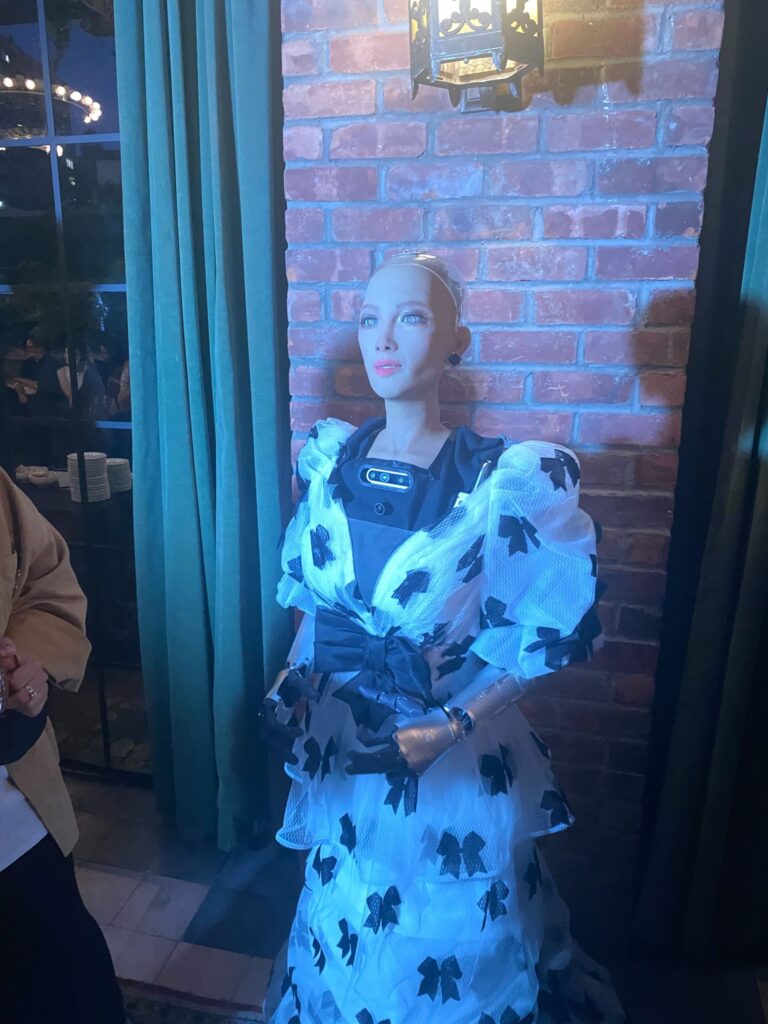Sophia at the Sophia premiere at Tribeca.
For Sophia (2022), documentary filmmakers Crystal Moselle (The Wolfpack, Betty), and Jon Kasbe (When Lambs Become Lions), teamed up to capture the eccentric inventor David Hanson in his pursuit to create a life-like robot. Rather than focusing on the ethical implications of developing AI, the directors opted instead for an entirely human story, documenting Hanson’s struggle to present Sophia to the world at the expense of his own wellbeing and that of his family. The documentary, which made its world premiere at the 2022 Tribeca Film Festival on Friday, is out on Showtime this September, and leaves viewers asking ominous questions about whether or not consciousness can be created in a lab, and about the future of robot-human relationships. We caught up with Moselle and Kasbe at the Sophia premiere for a conversation about the nuances of working with a silicone-covered rising star.
———
INTERVIEW: What was it like working with Sophia? How does she compare to other talents that you both have worked with in the past?
CRYSTAL MOSELLE: Um, wow.
JON KASBE: She’s very…she’s got a mind of her own. One thing I actually love about Sofia is you can’t really predict what she’s going to do.
MOSELLE: She’s so unpredictable, but it kept things exciting. When she would say really obscure, out-of-the-box things, it sort of made sense.
KASBE: Yeah, there is beauty in the accidents. There’s also something very childlike and almost naive about the way she moves through the world. She’s very innocent, but also very intuitive. We were drawn to that.
INTERVIEW: What would you say was the biggest on-set challenge?
MOSELLE: I mean, it’s a documentary, so we were documenting the process of her being made by David Hanson. He’s the mad scientist behind the whole thing, so we were just following the story.
INTERVIEW: What do you hope people take away from the documentary?
KASBE: I hope people come away from this excited about artificial intelligence and approach it from a place of hope and compassion. I hope people find ways to understand David and what he’s trying to do in the world—even if you disagree with how he’s doing it. At the end of the day, if you talk to anyone in this space, it’s pretty clear that we’re getting to a point where artificial intelligence is going to be much more prominent in our lives. We can resist it or we can embrace it, but I think embracing responsibly and thoughtfully is the best way forward.
INTERVIEW: How did you convince Sophia to do the documentary? Was it against her will, or was she open to it?
KASBE: We are very consent-forward filmmakers. We would never make a film about someone who didn’t want to be filmed.
MOSELLE: Yeah, we asked.
KASBE: We had a lot of conversations early on with David and his team about what this film was going to be, and how intensive it would be. It’s a vérité film, so we shot hundreds and hundreds of hours of footage. What you saw in the film tonight is really just the tip of the iceberg.
The post <i> Sophia </i> Reveals the Sinister Side of Robotics appeared first on Interview Magazine.

